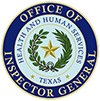FRAUD ALERT: Beware of scams targeting SNAP clients
The Texas Health and Human Services Office of Inspector General (OIG) is receiving reports of two scams targeting clients of the Supplemental Nutrition Assistance Program (SNAP).
Text/email scam
One scam involves a text message or email claiming to come from Texas Health and Human Services (HHS). Clients are threatened with losing their Lone Star Card benefits unless they call a toll-free number and disclose personal information, including the card number and PIN.
HHS will never contact a SNAP client via email, text message or phone to request account information. If clients receive a request, they should delete the message immediately. Clients should never share their account information.
Skimmers
Another scheme involves capturing Lone Star Card information when a client uses a device attached to the register's debit card reader known as a skimmer. Skimmers collect information in the card's magnetic strip and capture the PIN through a small recording device.
Card skimmers often look like part of the card reader, making them difficult to detect, but clients and retailers can identify the devices by looking for the following:
- Evidence of loose pieces that have been glued or tapped in place
- Places where a video camera may face the card reader or PIN pad of a register
- Number keys that feel soft, spongy or covered in plastic
Report Suspicious Activity
If a Lone Star Card has been affected, please call 800-777-7328 to cancel the card. A new card should arrive in the mail within seven days, allowing clients to access their balance. After canceling their cards, SNAP clients are encouraged to visit ReportTexasFraud.com or call 800-436-6184 to report the scam. For questions on the authenticity of letters and emails related to SNAP, contact the Lone Star Card Help Desk at 800-777-7328.
What happens to stolen funds?
Currently, HHS cannot distribute new funds to clients with compromised cards, highlighting the importance of reporting concerns quickly. OIG investigators report that some benefit thefts occur within one hour of the card being compromised.
To combat the issue, the OIG is working with the Federal Bureau of Investigations to track the use of stolen benefits and identify suspects.

